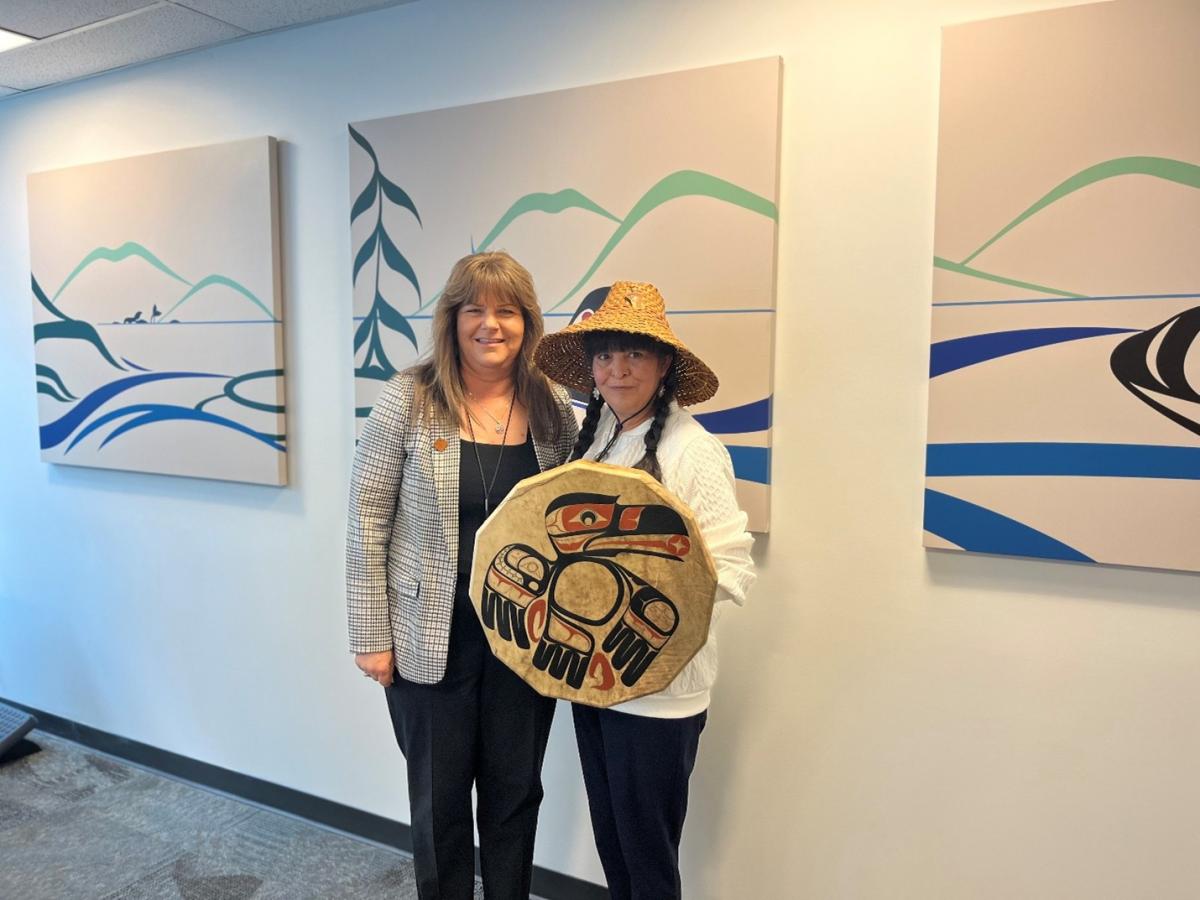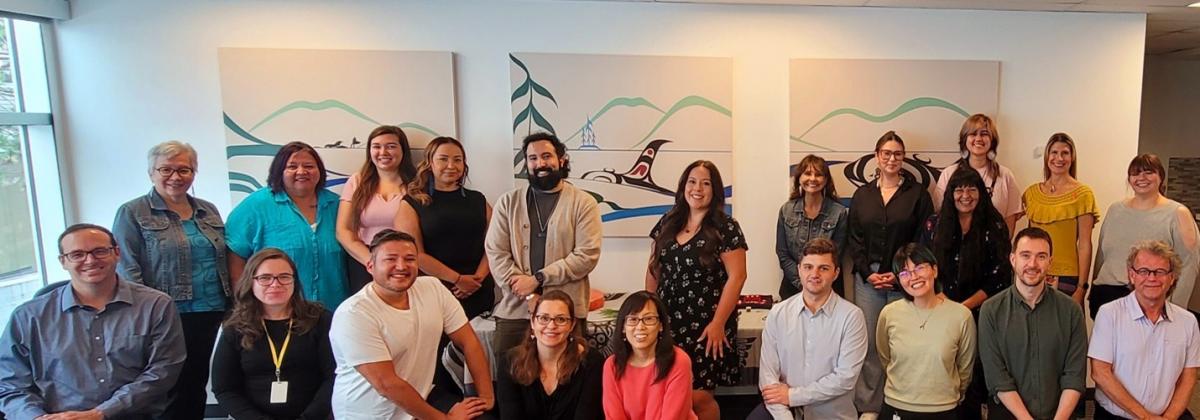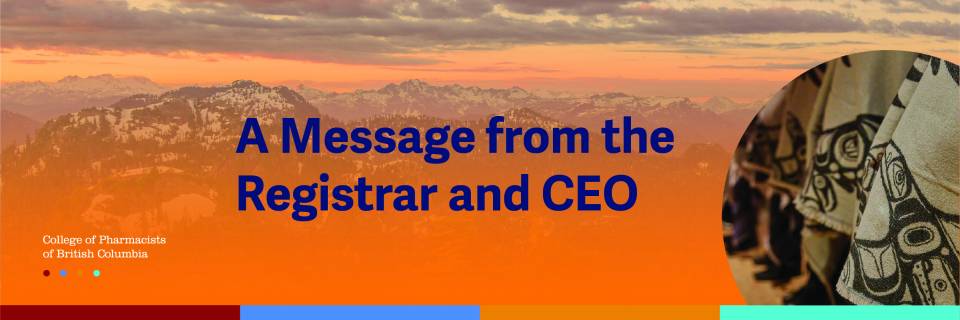Message from the Registrar and CEO: Learning through listening
Every time I fasten my Orange Shirt Day pin to my jacket, I’m reminded that reconciliation begins with choices that may look small but carry great weight. Listening — and being open to being changed by what we hear — is one of those choices.
Orange Shirt Day brings us back to Phyllis Webstad’s story, about how her new orange shirt was taken away on her first day at residential school. The National Day for Truth and Reconciliation asks us to honour the children who never came home, and to recommit ourselves to reconciliation. Together, they remind us that healing begins when we stop assuming we know what’s needed and instead create space to truly listen to the voices of Indigenous Peoples.
Learning from Indigenous Leadership
Listening in this way has been reshaping how we work as a regulator. Earlier this year we welcomed MaryAnn Enevoldsen to the role of Director of Indigenous Pathways – recognizing that Indigenous leadership belongs at the table, shaping how we work every day.

I think back to MaryAnn’s first board meeting. She reminded us that a territorial acknowledgment isn’t just something you say at the start of a meeting, it’s a responsibility — a way of grounding ourselves in the land and its relationships. She brought cedar into the room as good medicine for the work ahead and then offered a drumming song she had been learning. The energy shifted right away. What began as a routine meeting became a moment grounded in respect and accountability.
Since then, MaryAnn has become an integral part of how we think and work together. Her leadership is helping us ask bigger questions about what decolonizing our processes really means. It isn’t about tweaking policies around the edges. It’s about stepping back and rethinking how we understand our role as a regulator.
The more I learn, the more I realize that reconciliation is not a policy or a check list. It’s a living relationship built on reciprocity, respect and care.
Learning from Indigenous Communities
That shift has also changed how we show up when we’re invited into communities. In February, we visited the Tla’amin Treaty Nation in Qathet, where we learned about their health centre and the ways pharmacy care is being integrated into a broader vision of wellness led by the Nation. Then in May, MaryAnn and some of our partners were invited to the Tsay Keh Dene Nation, a remote community in northern BC. Like many of our visits, it was a chance to listen first and to let the community guide what needed to be understood.
They heard from Tsay Keh’s Health Director about how the flooding of the community’s lands decades ago continues to affect health and wellbeing today. He described the loss of traditional food sources, the disruption of connection to the land, and how these changes continue to shape physical, mental, and spiritual health.
What struck me most about these visits, was the generosity with which these truths were shared—the willingness to revisit painful history in the hope of helping us see more clearly. What stayed with me was the reminder that when health professionals arrive ready to listen, it can ease the burden on community members to explain or defend their experiences and create more space for healing.
That same commitment to listen and be guided by Indigenous voices also led us to establish the Indigenous Advisory Circle earlier this year. This group brings Indigenous perspectives directly into our work of decolonization, helping to hold us accountable and ensure that this change is not defined by us alone, but shaped by those with lived experience.

This, to me, is at the heart of reconciliation. Success here is not measured by how quickly we can fix things, but by our willingness to sit with truths that may be uncomfortable, and to hold differences without rushing to smooth them over.
Why Learning Matters
Last April we introduced a new requirement that every pharmacy professional in BC must complete three hours of Indigenous Cultural Safety, Cultural Humility, and Anti-Racism learning each year. We did this because of the In Plain Sight report, because our Indigenous Cultural Safety, Humility, and Anti-racism Practice Standard calls for continuous learning, and because we believe that when individuals grow, the whole healthcare system can begin to change.
Since then, I’ve heard pharmacists share how this learning has shaped their practice. One reflected “Learning about the history of Indigenous Peoples in BC changed how I think about the care I provide. I realized that trust is something I need to earn each time, by showing respect and humility, not assuming it’s already there.” Another shared, “The training made me recognize how systemic racism shows up in healthcare. It’s not just about my individual interactions; it’s about being aware of the structures clients are navigating. That awareness has shifted how I advocate for people in my practice.”
That is exactly the kind of shift this work is meant to create - starting with good intentions, moving to genuine self-reflection, and then taking action.
We are now about six months away from the March 2026 deadline for registrants to submit their continuing education requirements. It may seem like there is still plenty of time. But growth like this takes reflection, openness, and practice. The deadline gives us structure, but its purpose is to keep us learning – and to keep changing how we show up for people each day.
On this day of remembrance and learning, I want to thank the Indigenous leaders, pharmacists, and communities who continue to share their stories with us. Your voices are helping us see more clearly and walk further together on the path of reconciliation.
If you’re ready to lean into this learning, our Indigenous Cultural Safety, Cultural Humility and Anti-Racism Page has resources to help you get started or go deeper. But the most powerful learning will always come from being present, open, and willing to be changed by what you hear.
Suzanne Solven
Registrar and CEO | College of Pharmacists of British Columbia
